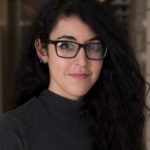*This is a work of fiction, inspired by real events
He was a beautiful man, with profound eyes filled with pools of copper and a jawline so sharp it stung to look at. I met him through mutual friends – we were at one of those free music festivals Atlanta loves to throw during the spring. “Bijan,” he answered, unsmiling, when I asked for his name.
I had to ask again to hear him over the off-tune indie band playing nearby and the surrounding cliques’ overlapping conversations. I grinned. “Does that mean you’re my hero?” I teased, playing on the Farsi meaning of the name, trying to help him relax. I know what anxiety is like. He merely grimaced and replied, “Yeah.”
My girlfriend smiled sheepishly at our exchange. “Bijan comes from Persian parents as well. I thought I’d introduce you, because Middle Easterners can only date each other, right?” That was a joke, I learned later that evening – Bijan was gay.
We went out for dinner after the festival ended. I ordered spaghetti with tomato and basil sauce, while he opted for mozzarella cheese sticks and a dirty martini. “Yeah,” he said, between licking the salt off an olive, “I used to have a boyfriend. Handsome, tall fellow. A godsend in the gay community – to find a guy who wanted to be exclusive AND was ‘manly’ enough for me to take home without having to come out? Bless. Things didn’t work out, though. It is what it is.”
His demeanor was ambiguous- I couldn’t determine whether he was really nonchalant, or just resigned about the situation.
Bijan wasn’t actually from Atlanta. His parents lived in Nashville; he was here doing his Master’s in Public Health at Emory. He wanted to help impoverished men and women of color in urban communities with commonplace STI’s receive necessary treatment and prevention. Bijan was an intelligent student, but didn’t receive enough funding for his studies. Fortunately, his parents were wealthy enough to fund his degree, housing, and other needs while he built the foundation for his life.
I was fond of Bijan. We didn’t hang out much after that night, but we made time to get cappuccinos or go to shows a handful of times over the next few months. Those few times, we talked (argued) about religion, local occurrences, and epidemiology. I admired him for his pure intentions – he truly believed he could “make the world a better place” through his research, despite the seemingly insurmountable obstacles world health organizations often faced, like lack of funding or permission to send aid into certain areas. He had faith that goodness would prevail. But that faith appeared to be nonexistent when it pertained to his own life.
“Yeah, my parents have a list of women for me to meet in the occasion I don’t bring one home before I turn 27,” he’d lament. “Muslim, or Coptic Christian. They really expect me to carry the family name, because I am the ‘man of the family.’ Pardis, my only sister, is older than me, but she eloped with a guitar player a few years ago. Extraordinarily cliché, but aren’t we all? I don’t know where she is now. Anyway, they’ve cut her off and now it’s just me and Parsa, who is still in the 7th grade.”
Bijan spoke quickly, like he wanted to get a confession with a sheikh or priest over with, like I was about to assign him a punishment for simply existing. “They can’t get over the fact that they came here from Iran to have a better life, that they managed to literally go from rags to riches with their business, and they still managed to have a ‘fuck-up’ for a daughter. It puts so much pressure on me and Parsa to be great, to be venerable characters in the narrative they’ve imagined and ingrained in their heads. It’s why, despite the legalization, I will never be able to marry the man I love.
Because what the hell kind of Iranian can tell their parents, that their son has a husband? I would bring dishonor upon my entire community.
“I don’t know why I’m telling you this. You know, I haven’t made many friends I like here. It’s hard for me to trust people. I feel like everyone lets me down. But I guess telling you all this doesn’t really make a difference.” Bijan confused me sometimes, as well, but when I prompted him for an explanation, he rarely conceded. I chose to enjoy his company, nonetheless, and take what he would give me.
I never got the sense that Bijan was a particularly happy individual, despite his aspirations and fertile inner life. Then again, very few are. Yet, nothing could prepare me for the letter I received early this year from – of all people- Bijan’s mother, stating that he had killed himself and left me a note. She didn’t write anything else, except that she hoped that Bijan hadn’t portrayed her and her husband as ‘bad people’ to me, and that they had tried their hardest to do everything they could for their beloved son.
Dearest Laila,
I hope this letter reaches you well, given the circumstances. If you’re reading this, I am gone. There is nothing you could have done. I want to thank you for being a wonderful friend during the short time we knew each other. In a different life, with different neurobiology, I might have loved you more than a friend. Alas, it was not meant to be.
I write this, because I want you to know. I need to validate to myself that my act is not entirely selfish.
When I was 23, I contracted HIV from a hookup. At least, I want to think it was from a hookup. Unless my ex cheated on me, then I got it from him. It doesn’t really matter though.
Yeah, yeah, I know: HIV is incredibly treatable, to the point where it doesn’t even have to shorten your life expectancy, you just have to take antivirals and enzyme replacement therapy, but that doesn’t matter. It doesn’t matter because HIV is the last straw for me. It’s the last straw on top of being atheist, on top of being gay, on top of an unforgiving world. I’ve been ready for this for years – the universe just told me it was time.
My father once said that he would rather me have cancer than an STI. I took that as indication that he would, façade and obligatory consolations aside, honestly prefer me dead than shameful. Everything about me is shrouded in shame. This, my death, is my gift to my parents: they can tell their family I died of a broken heart, of mental illness, of anything else, rather than the ugly truth. And maybe it’s true: maybe I am a product of my own relentless self-destruction, a product of gin, sex, and blasphemy.
I am not blaming anyone. Some people weren’t just meant for this world, not human enough, too human. I truly believe I will find peace after this. I’m going to sleep – for eternity.
With utmost love,
Bijan
I did cry. Sobbed, in fact. And I was furious, absolutely enraged, at his casual tone in the letter. Did he not understand the depth of his actions? Did he not understand the implications for his family? His poor brother, now all alone in a cruel world?
His mother didn’t leave any contact information in her note, which is just as well. I had no desire to speak about Bijan ever again. I could only imagine how he completed the act- was it here in Atlanta? Did he blow his brains out, leaving his roommate a grotesque final image of him? I shuddered, and prayed to forget Bijan’s beautiful face.
I eventually reconciled with the fact that I couldn’t call Bijan again, and would never again listen to him talk about his work, or his family, or anything. That he was gone, never to return.
Bijan was an astounding man that touched my life, and broke my heart with his demise. I wish his tale was a unique one, but I know it’s not, because suicide is the leading cause of death among young adults in the developed world, and I know that a high percentage of suicidal individuals never seek help, and I know that many people of color believe suicide, death, is the honorable way to go when they’ve disrespected the culture they come from.
And I wish for the next generation of humans on this planet to be more merciful to the gays, to the different, to each other, and I wish for the next generation of humans on this planet to cater to those who don’t know how to be alive in their communities, or anywhere else. I wish for a more forgiving world, one Bijan could have lived in, flaws and all.


